For the first time, a preparatory meeting for the 28th Conference of the Parties to the United Nations Framework Convention on Climate Change (UNFCCC COP28) was held at the regional level. A high-level government meeting was held on 7 November 2023 in Astana, Kazakhstan.
High-level government officials of ministries and departments of all Central Asian countries in charge of climate change issues – Kazakhstan, Kyrgyzstan, Tajikistan, Turkmenistan and Uzbekistan – discussed the topical and significant issue of building up regional cooperation to address climate change problems at the large-scale Central Asian Forum “Central Asia on the Way to the 28th Conference of the Parties to the UNFCCC: 5 countries – 1 region – 1 voice”.
As noted by Zafar Makhmudov, Executive Director of the Regional Environmental Centre for Central Asia (CAREC), CAREC organized the joint preparatory meeting prior to the UNFCCC COP-28 at the initiative of the Ministry of Ecology and Natural Resources of the Republic of Kazakhstan in cooperation with the International Center for Green Technologies and Investment Projects and with the financial support of GIZ, USAID and UNDP.
In his speech, Torsten Brezina, Regional Program Coordinator of GIZ, drew attention to the importance of holding this event at a high regional level on the eve of the UNFCCC COP28, which will contribute to more effective promotion of climate change issues at the international level.
Suna Pak, Advisor to the Minister of Ecology, Environmental Protection and Climate Change of the Republic of Uzbekistan, also praised the organization of the joint meeting, noting that the participants witnessed a historic event. Never before in the Central Asian region have such high-level meetings been held before the Conference of the Parties to the UNFCCC.
Another historic event for Central Asia at the Conference of the Parties to the UNFCCC
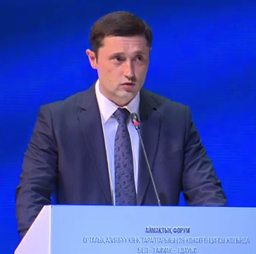
Executive Director of CAREC Zafar Makhmudov stressed the importance of the forum as the first and the only platform for the time present where countries have the opportunity to share views, national priorities, their position in the negotiation process and identify common interests before the Conference of the Parties to the UNFCCC. He expressed the hope that preparatory meetings for the Conferences of the Parties would be held annually with the support of national and international partners.
“I hope that this forum will be productive and allow us to prove the need to hold such a forum
annually before each Climate Change Conference of the Parties, possibly on a rotating basis in different cities in Central Asia.”
Zafar Makhmudov also stressed that CAREC, in addition to its mandate to work in each Central Asian country, also has practical experience in the implementation of regional, intercountry, cross-border and national projects on the ground.
“To conduct dialogues, we create platforms for representatives of various levels, representatives of basin councils in transboundary territories, academic communities of Central Asia, we specifically support a network of women water specialists, of course, we provide platforms for representatives of relevant ministries, and, in recent years, parliamentarians of Central Asian countries. We also organize and assist in launching pilot processes, such as the dialogue between sectors, the so-called Nexus approach, between water, energy, environmental and food security sectors,” said Zafar Makhmudov.
In addition, the organization of the regional climate forum is part of the overall preparatory process for COP28, which includes the preparation of regional statements and the organization of a separate Central Asian Pavilion at COP28. “CAREC received these proposals during the last meeting of representatives of the ministries of foreign affairs and parliamentarians of the Central Asian countries, which took place in April this year in Tashkent, Uzbekistan,” the CAREC Executive Director said.
Consolidate Central Asia
The first part of the forum was devoted to the joint finalization of the draft regional statement on behalf of the governments of the Central Asian countries, which will be announced at the UNFCCC COP28. As noted by the participants, the draft regional statement has been conceptually agreed upon and now must go through the procedure of coordination at the national level in each Central Asian country before being submitted to the UNFCCC COP-28.
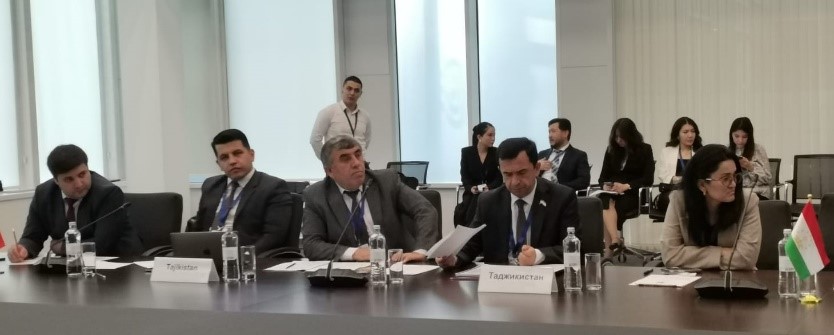
The participants once again worked out each point of the text of the regional statement, based on the principle of taking into account the interests of both each country and the entire region. All the proposals in the text of the regional statement pursued a single goal – to strengthen the region's position at the UN Global Climate Forum (COP-28) and to present Central Asia to the world community as a consolidated region confronting all climate challenges with a united front.
Everyone unanimously agreed that the text of the regional statement has been finalized, and the process of its coordination at the national and regional levels should begin through the foreign ministries of the Central Asian countries.
What Central Asian countries will talk about at UNFCCC COP28
During the official part of the high-level preparatory meeting on the eve of the UNFCCC COP28, the participants represented their achievements and priorities for combating climate change, adaptation and mitigation at the session “Climate Agenda in Central Asia”.
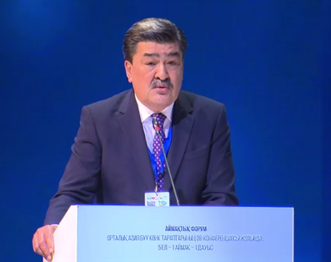
Opening the official part of the regional forum, the Minister of Ecology and Natural Resources of the Republic of Kazakhstan Yerlan Nysanbayev stressed that joint efforts in the fight against climate change and unification of the region are extremely important for long-term sustainable development and a prosperous future for the region. If the Central Asian countries act jointly and voice a single regional statement at the UN global climate summit, this will help the region and each country tackle significant climate problems at the national level and participate in the global solutions processes at the Conferences of the Parties to the UNFCCC.
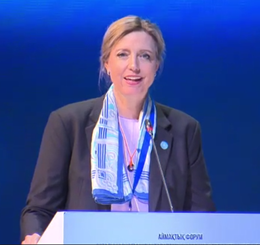 UN Resident Coordinator for Kazakhstan, Michaela Friberg-Storey, noted the importance of commitment to the UN Sustainable Development Goals in light of climate change adaptation and mitigation. She expressed confidence that the unifying position of the region as “5 countries – 1 region – 1 voice” supports multilateralism in decision-making. According to her, each country in the Central Asian region contributes significantly to mitigating the effects of climate change.
UN Resident Coordinator for Kazakhstan, Michaela Friberg-Storey, noted the importance of commitment to the UN Sustainable Development Goals in light of climate change adaptation and mitigation. She expressed confidence that the unifying position of the region as “5 countries – 1 region – 1 voice” supports multilateralism in decision-making. According to her, each country in the Central Asian region contributes significantly to mitigating the effects of climate change.
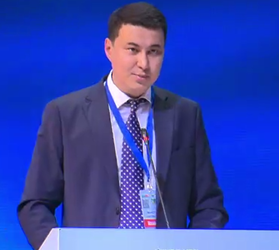
Vice Minister of Ecology and Natural Resources of the Republic of Kazakhstan Mansur Oshurbayev said that climate change is one of the tasks of inclusive and investment development of the country. According to expert estimates, the damage from the consequences of climate change could amount to 20% of GDP per year. Mansur Oshurbayev informed the participants about the work carried out by Kazakhstan on adaptation and mitigation. The country plans to increase energy production from clean sources by five times - from 3% to 15%. To address the issues of the carbon market, Kazakhstan is interested in integration with the European system for regulating greenhouse gas emissions. According to him, the Central Asian region must be the focus of attention of the “Loss and Damage” Fund created at the UNFCCC COP27 last year.
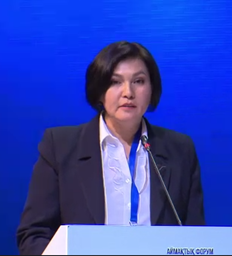
Deputy Minister of Natural Resources, Ecology and Technical Supervision of the Kyrgyz Republic Assel Raimkulova stressed that Kyrgyzstan is one of the countries vulnerable to climate change and is taking all measures in accordance with the Sustainable Development Goals (SDGs). She noted that 60% of greenhouse gas emissions come from the energy sector, and the country intends to focus on the development of renewable energy sources (RES), as well as the implementation of measures for the sustainable development of mountainous areas. Assel Raimkulova expressed hope that the commitment of the countries of the region to a unified approach to combating climate change will be supported by the world community.
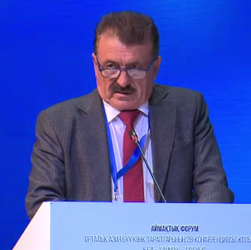
Deputy Chairman of the Committee for Environmental Protection under the Government of the Republic of Tajikistan Abdulkodir Mavlodod noted that the impact of climate change on the environment is increasing, and many sectors of the economy and public health are becoming more vulnerable. Tajikistan is highly vulnerable to the effects of climate change, as 93% of the country's territory is mountainous. The melting of glaciers and changes in the flow of large rivers are becoming one of the factors of the negative impact of climate change on energy, water resources, agriculture, and transport. Today, the country pays great attention to low-carbon development and ranks 6th in the world in the production of green energy. Abdulkodir Mavlodod stressed that Tajikistan attaches great importance to regional and international cooperation.
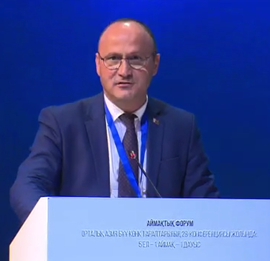
Head of the Department for Coordination of International Environmental Cooperation and Projects of the Ministry of Environmental Protection of Turkmenistan Berdy Berdiyev informed that a lot of work is being done in Turkmenistan to protect the environment. The country is implementing a set of measures to fulfil the obligations of the Paris Agreement in the field of reducing greenhouse gas emissions. In November this year, work began on the development of a roadmap for the implementation of Nationally Determined Contributions (NDCs) with the participation of relevant agencies.
Turkmenistan has great potential for the development of renewable energy sources - solar and wind energy. For example, the volume of solar energy is more than 190 billion tons of equivalent fuel. As noted, the country is interested in international cooperation to reduce methane emissions into the atmosphere.
Note: Methane emissions are the second largest cause of global warming. This gas has a global warming potential that is more than 80 times that
of carbon dioxide over 20 years. However, methane has a shorter lifespan in the atmosphere than carbon dioxide: only 12 years compared
to hundreds of years. It means that reducing methane emissions will help lower temperatures rapidly.
In addition, Turkmenistan is in favor of opening a Regional Climate Technology Center for Central Asia under the auspices of the UN, which will deal with the transfer of climate technologies to the Central Asian region.
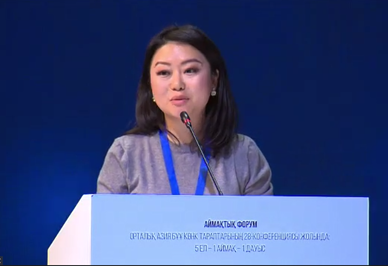
Suna Pak, Advisor to the Minister of Ecology, Environmental Protection and Climate Change of the Republic of Uzbekistan, stressed that the climate change agenda is a priority for Uzbekistan. Several documents have been adopted in the country, active work is underway on the transition to a green economy, and the Central Asian Institute on Climate Change (Green University) has recently been established. Its goal is to effectively manage local, regional and global environmental problems, strengthen regional cooperation in the field of ecology and environmental protection, and introduce innovative ideas, practices and technologies.
All participants of the climate forum in Astana expressed the opinion that regional cooperation and unification of the region is an extremely important and priority area in solving climate challenges.
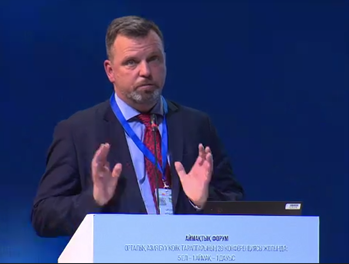
According to Torsten Brezina, GIZ Regional Program Coordinator in Central Asia, the issue of strengthening regional cooperation is one of the most important for the region. The Central Asian countries have great potential to be heard in the international arena only if they act as a single region, with a common regional statement, and actively participate in the negotiation process as a region, and not as individual countries. Torsten Brezina briefly presented information about the GIZ Green Central Asia Initiative and emphasized that within the framework of this Initiative, the first regional strategy for adaptation to climate change in Central Asia has been developed, which is at the stage of coordination and will be presented at the UNFCCC COP28, as one of the indicators of joint regional efforts of the Central Asian countries aimed at adapting to climate change in the region including glacier monitoring and climate risk management.
Central Asia and International Cooperation
Alexey Kokorin, an international expert of CAREC, acquainted the participants of the regional climate forum with the opportunities that the UNFCCC COP28 can present for the countries of Central Asia.
In Dubai, COP28 identified three priorities: adaptation, loss and damage compensation, and the most vulnerable local communities. Much attention will also be paid to summarizing the global results of adaptation and the Paris Agreement.
At the previous COP27, a decision was made in principle to create a loss and damage mechanism when climate change has caused damage that can neither be prevented nor repaired. At COP28, a loss-and-damage mechanism for the provision of financial assistance will be developed. At the moment, a note has been developed, which has no legal status, but it already emphasizes the importance of direct funding (grants) for local communities.
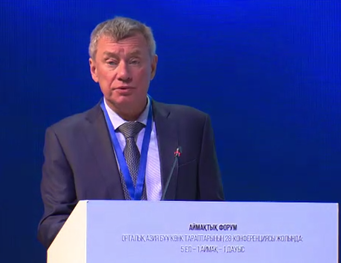
Alexey Kokorin stressed that the Conference of the Parties in Dubai is a bridge to the next Conference, which will most likely be held in Bonn and will focus on adaptation, financial issues and low-carbon development.
According to him, in 2025, the UNFCCC COP30 will most likely focus on nature and will take place in Brazil, probably in the Amazon, a region severely affected by the effects of climate change. The international expert recommended preparing for the upcoming Conferences of the Parties in advance.
Alexei Kokorin thinks that COP28 can be considered a success for the countries of Central Asia:
1. If the decision of the “Loss and Damage” Fund will include the Central Asian countries as beneficiaries;
2. The decisions of the Conference of Parties consider the peculiarities of the Central Asian countries (mountains, glaciers, water scarcity);
3. The Central Asia pavilion and regional statements demonstrated the readiness of the region to actively participate in solving the climate problems and promoted partnerships with a wide range of organizations, from international financial
institutions to NGOs.
Representatives of leading international organizations working in the region spoke about the contribution of international partners to the climate-sustainable development of Central Asia, initiatives and action plans: Katarzhina Vaviernia, Permanent Representative of the United Nations Development Program in Kazakhstan, Maciej Madalinski, Deputy Ambassador of the European Union to Kazakhstan, Luis Rivera, Director of the USAID Regional Mission in Central Asia, Zsuzsanna Hargitai, Managing Director for Central Asia of the EBRD, Urvashi Narain, Head of the Central Asia Program of the World Bank, Malte Maas, Climate Change and Sustainable Development Department, Asian Development Bank.
During the forum, a Memorandum of Understanding was signed between the Regional Environmental Centre for Central Asia (CAREC) and the United Nations World Food Programme on joining efforts in achieving the Sustainable Development Goals aimed at adapting to climate change and mitigating its effects, achieving food security, reducing poverty in rural areas, improving livelihoods through the implementation of their respective programs in the region Central Asia.
The meeting is held within the framework of the project “Strengthening coordination and positioning of Central Asia in global climate processes” implemented by CAREC under GIZ support and is part of the series of meetings “Regional Dialogue of Central Asian Countries on Joint Preparation for the 28th Conference of the Parties to the UN Convention on Climate Change”.
By Zhanna Khusainova
Photo: Sanjar Mustafin
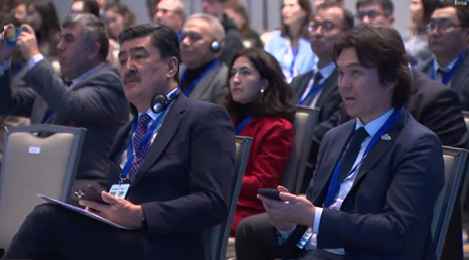
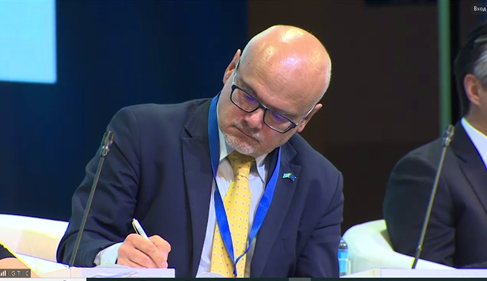
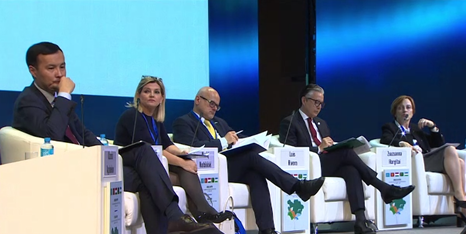
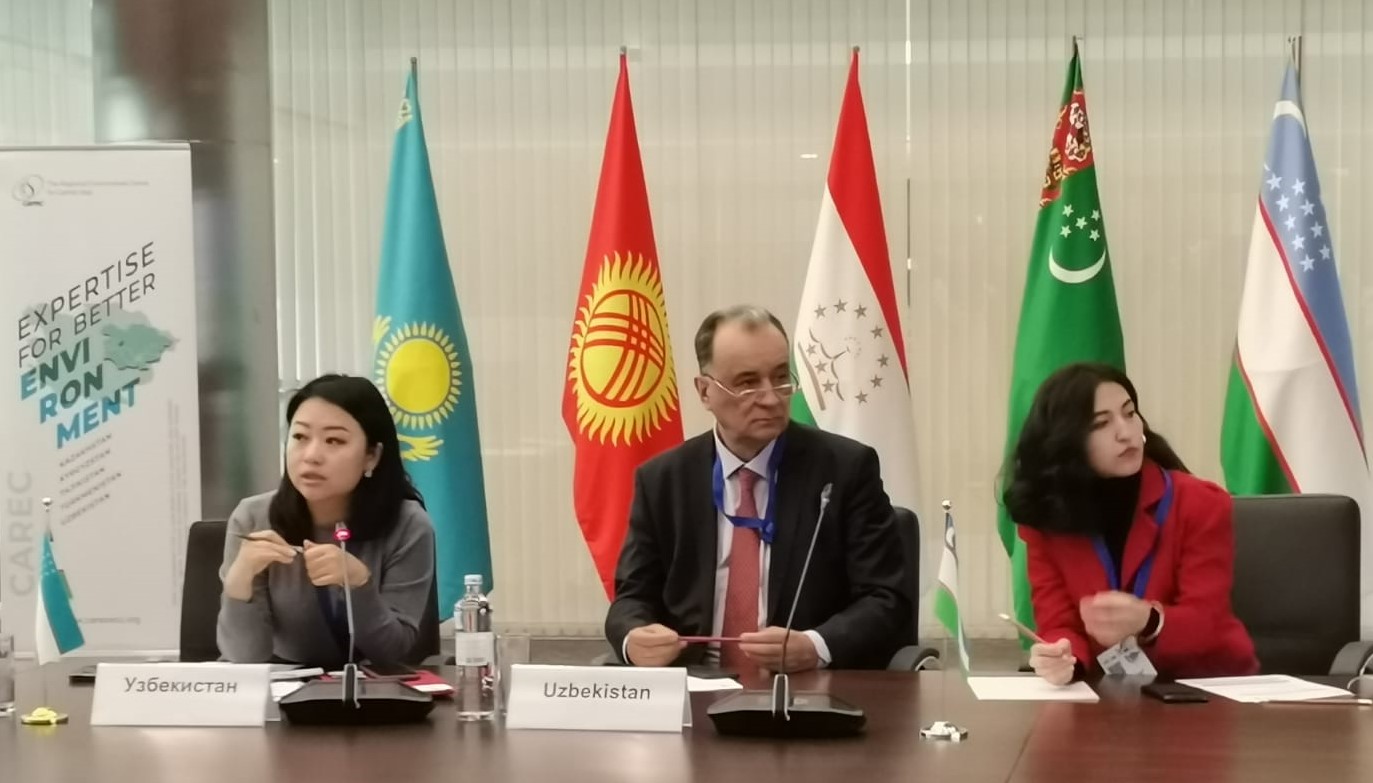
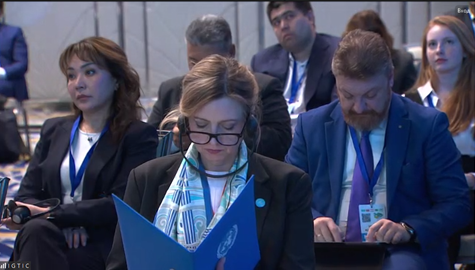
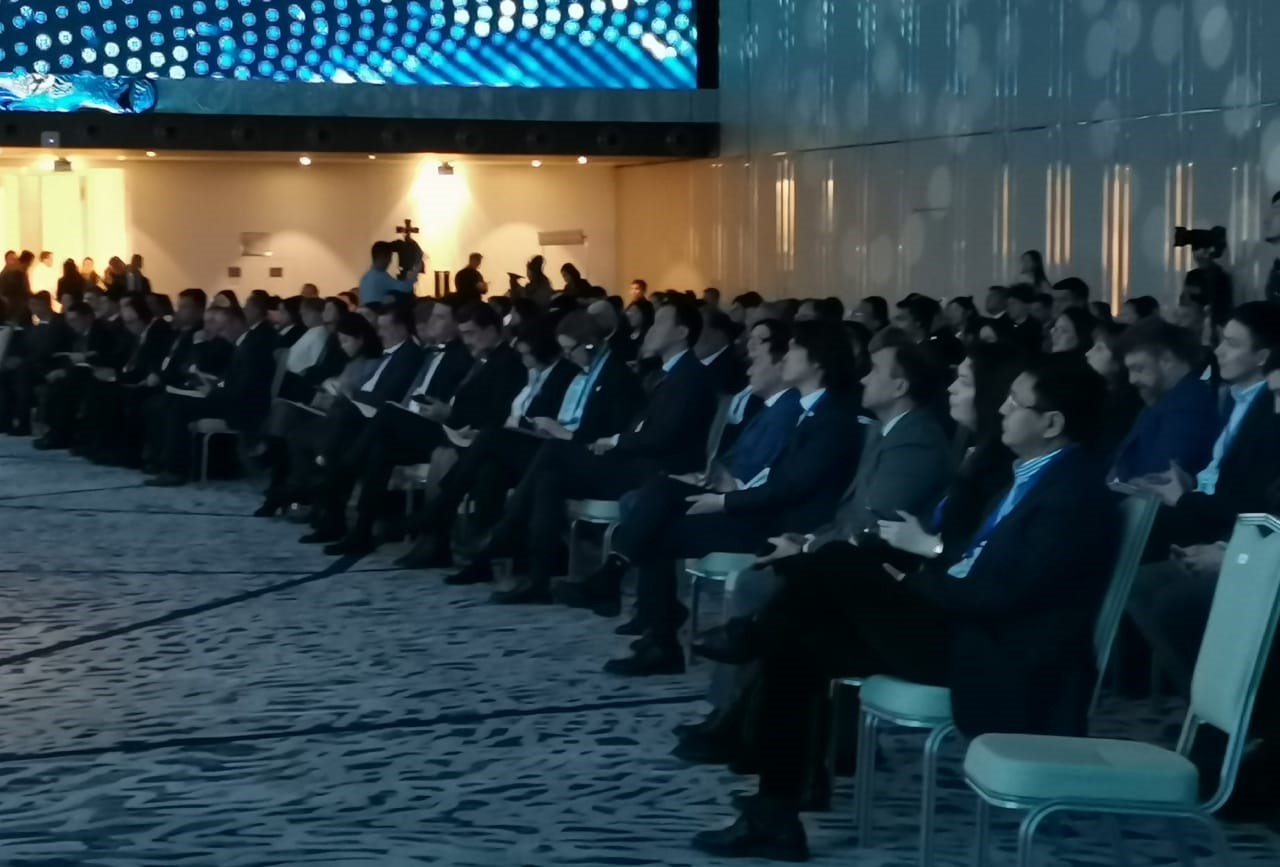
.jpeg)
